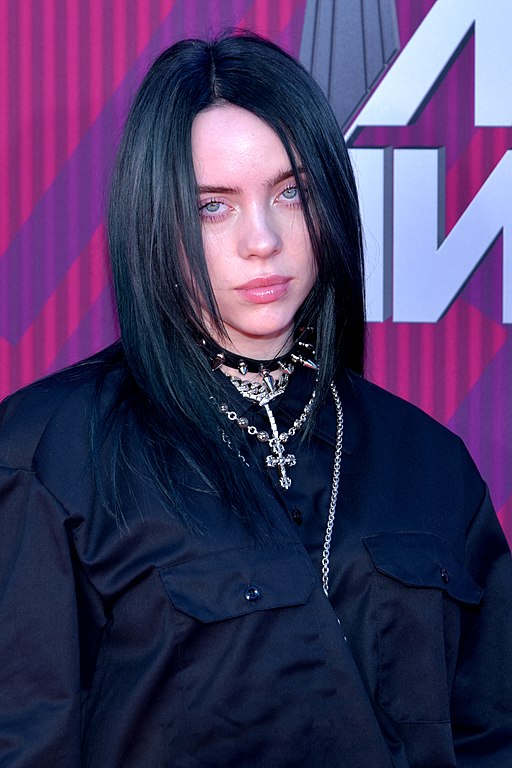From Beyoncé’s genre-defying dominance to unexpected nods for André 3000’s flute album, this year’s nominations reflect the Grammys’ struggle to stay relevant while honoring artistic innovation.
A closer look at the intriguing narratives emerging from this year’s Grammy nominations, including Drake’s absence, André 3000’s flute music recognition, and overlooked gems in the Album of the Year 2024 race.
The Headliners in Grammy Nominations 2024
The headliners for the Grammy Nominations 2024 are unsurprising: Beyoncé, Kendrick Lamar, Billie Eilish, and Taylor Swift continue their reign as industry favorites. Rising stars Sabrina Carpenter and Chappell Roan have made their mark in the Grammy Award for Best New Artist category, while Shaboozey and Charli XCX have become ubiquitous.

Frank Vroegop with Beyoncé Knowles during the shoot of a film for the L’Oréal brand, 13 July 2004
Photo credit: Vavox Project, CC BY-SA 4.0 https://creativecommons.org/licenses/by-sa/4.0, via Wikimedia Commons
Gone are the days when the Grammys seemed out of touch with popular music. Under Recording Academy CEO Harvey Mason Jr. and with new Grammy voters, the awards show now largely aligns with Billboard charts, radio play, and streaming trends, spotlighting current celebrities.
Yet, as with any Grammy Awards, not everyone is satisfied. After scrutinizing the 94 categories in the 67th annual nominations, The New York Times pop music team – reporter Joe Coscarelli, chief pop music critic Jon Pareles, pop music critics Jon Caramanica and Lindsay Zoladz, and Culture editor Elena Bergeron – were left pondering: Is Beyoncé’s genre-spanning dominance justified? Why are the Beatles still in the mix? Have the Grammys become too predictable?

Kendrick Lamar transparent background, 25 May 2021
Photo credit: Fuzheado, CC BY-SA 4.0 https://creativecommons.org/licenses/by-sa/4.0, via Wikimedia Commons
Reflecting the Mainstream
JOE COSCARELLI- I find myself almost nostalgic for the days when the Big Four categories – album, record, and song of the year, plus best new artist – were less predictable. It wasn’t long ago that Beck’s upset win over Beyoncé made headlines. While occasional surprises still occur, like Jon Batiste (album of the year, 2022) or Bonnie Raitt (song of the year, 2023), the chances of a truly shocking major win in February seem slim, likely by design. Do we – dare I say – miss the era when these top nominations were less foreseeable and more likely to spark debate?
JON PARELES- The Grammys’ past obliviousness to music trends was oddly entertaining. It helped listeners shape their tastes against industry preferences. But the Grammys needed to evolve for awards to honor quality and impact truly. Even with a more informed approach to the Grammy voting process, there’s still room for debate.

Photo credit: MTV UK, CC BY 3.0 https://creativecommons.org/licenses/by/3.0, via Wikimedia Commons
JON CARAMANICA- This shift feels like an overcorrection, blurring the Grammys’ purpose. The awards should reflect peer recognition, emphasizing artistic merit. However, fan popularity seems to be the hidden criteria when nominees mirror charts. (That’s what the American Music Awards do.) The chance for talented but lesser-known artists to break through now seems slim, unlike in the past when older artists often overshadowed younger ones.
LINDSAY ZOLADZ- For several years now – at least since the former Recording Academy president faced criticism for telling female artists to “step up” for better Grammy representation – women in pop have consistently dominated major categories. This year is no exception, with Beyoncé, Billie Eilish (who already has multiple Billie Eilish Grammy wins under her belt), Sabrina Carpenter, and Chappell Roan among the top nominees for Album of the Year 2024, as expected.

Sabrina Carpenter in a photoshoot for Converse in 2019
Photo credit: Phillip Mansfield, CC BY 3.0 https://creativecommons.org/licenses/by/3.0, via Wikimedia Commons
From Left Field
COSCARELLI Despite the female-dominated lineup, two men managed to secure album of the year nods as musical outliers, though they’re arguably Grammy insiders. Jacob Collier, a six-time winner and studio whiz, got his second album nomination for the “Djesse” series. André 3000, last rap act to win the top award with Outkast, was nominated for his André 3000 flute album “New Blue Sun” two decades later.
ELENA BERGERON – André 3000’s nominations for album and best alternative jazz album seem like the Academy’s attempt at surprise, but it’s a predictable stretch. The album’s been well-received, even live, despite some fans wanting him to rap. André’s asked for patience with his flute work, and the Grammys appear to be validating this artistic shift. But this rewards effort, not mastery (nominating Shabaka’s “Perceive Its Beauty, Acknowledge Its Grace” would’ve done that in alt jazz). Maybe this sets up a nice moment for the broadcast, given his win with Outkast 20 years ago?
CARAMANICA – You might see André 3000’s flute album nomination as a win for artistic growth. It’s nice that a beloved musician is praised for trying something new. But his nods in alternative jazz and instrumental composition categories highlight a classic Grammy issue: What happens when a star is rewarded for dabbling in a less mainstream genre? A famous pop musician nominated in a category usually filled with lesser-known artists can skew the voting. Depending on your view, it either spotlights overlooked musical styles or overshadows those who’ve long worked in these areas with little recognition.
Rebooting the Beatles
COSCARELLI- The Beatles stand out as another clear exception to the current trends. “Now and Then,” a new track built from a late-1970s John Lennon demo, got a nod for record of the year. It’s up against hits like “Espresso,” “A Bar Song (Tipsy),” and “Not Like Us” in the Grammy Song of the Year nominees list. The question is: Why?
PARELES – The simple answer? Boomer nostalgia. The song echoes other Beatles tunes and even uses some old backup vocals, stirring up fond memories. It’s also a tech marvel; 2020s tools were needed to get a usable Lennon vocal from the original tape. The Grammys tend to like studio skills.
COSCARELLI – What about CGI skills? The music video is one of the most unsettling I’ve seen. It shows the older Beatles joking around with their younger selves and late bandmates.
PARELES – There’s also the Grammy habit of giving belated awards to big names. While “Sgt. Pepper” won album of the year in 1968 – a first for rock – “Revolver” and “Abbey Road” only got nominations, and “Hey Jude” lost record of the year. “Now and Then” is likely the Beatles’ last song, and last shot at a Grammy. (It’s also up for best rock performance, just in case, though it’s not really rock.)
Meanwhile, another boomer favorite, the Rolling Stones, got less Grammy love for making lots of new music. Their lively late-2023 album “Hackney Diamonds” is up for best rock album. But it’s not in the running for album of the year; Jacob Collier is.
‘Brat’ Winter
COSCARELLI – In a year where big releases often fade quickly, Charli XCX’s “Brat” had an unusually long cultural moment. Much of its impact, though, was outside traditional music channels, in areas the Grammys don’t always notice. So, it’s surprising to see “Brat” so well-represented here. Charli XCX got seven nominations (she only had two before, both for “Fancy” with Iggy Azalea). Her collaborator, A.G. Cook, also got a nod for the Addison Rae remix of “Von Dutch”. Is this unexpected?
ZOLADZ – I expected “Brat” to do well, but not this well. Charli got more nominations than Swift and is second only to Beyoncé. The Academy clearly liked it. The nods cover several songs: “360,” “Von Dutch,” “Apple,” and the “Guess” remix with Eilish. Charli faces tough competition for record and album of the year, but she’ll likely win in dance and electronic categories. Now we’re just wondering who’ll do the “Apple” dance at the ceremony. Jacob Collier? Harvey Mason Jr.?
Is It Finally Beyoncé Time?
PARELES If you want lots of nominations, you need to fit into (or squeeze your music into) multiple genre categories. That’s what Beyoncé did with “Cowboy Carter,” showcasing her Beyoncé genre dominance.
ZOLADZ – “Cowboy Carter” isn’t just an album; it’s a challenge to the Academy. It’s like Beyoncé’s saying, “What if you don’t give me album of the year this time?” She even sings, “AOTY I ain’t win,” on “Sweet Honey Buckiin’.” As Doreen St. Felix wrote in The New Yorker, that line might not age well. So, I wasn’t shocked to see “Cowboy Carter” get so many nominations. But I was surprised it showed up in so many different genres. We were all wondering if it would make it into country categories, especially after the Country Music Awards ignored Beyoncé completely.
Given the buzz around that choice, I thought the Grammys would be more careful. But I think they went too far by nominating the energetic, Tina Turner-like “Yaya” for… best Americana performance. Sure, “Cowboy Carter” is a big, bold, and sometimes too-obvious statement about genre limits in American pop music. And yes, “Americana” is a vague category. But really?
CARAMANICA – It’s worth noting that Beyoncé got more total nods in country music categories than Kacey Musgraves, Jelly Roll, or Morgan Wallen – the genre’s biggest star who also had one of 2024’s biggest pop hits – or any other mainstream Nashville country artist. That’s a fact that will be interpreted in many ways. As a side note, there are no Zach Bryan nominations in these categories either. This isn’t because he’s rightly distanced himself from the country label, but because he’s joined a group of artists, including Drake, the Weeknd, and sometimes Kanye West (now Ye), who choose not to submit their music for Grammy consideration.
The Anti-Drake Club
CARAMANICA – Ye submitted this year – “Carnival” is up for best rap song. But even without Drake Grammy nominations, there’s still a lot of Drake – or anti-Drake – energy present. Most clearly, there’s praise for Kendrick Lamar’s “Not Like Us” (no “Meet the Grahams”?) and also for Future and Metro Boomin’s album “We Don’t Trust You,” which could be a contender for Hip Hop Album of the Year 2024. Drake is still one of the genre’s biggest stars, and maybe now its biggest rival. If he didn’t make the most popular rap music of the year, at least he inspired it.
Also Left Out
COSCARELLI – Any other oversights? The absence of Tommy Richman’s “Million Dollar Baby,” a standout single this year, was noticeable. Seems the genre debate was pointless after all. And Dua Lipa got zero nods, despite opening the show earlier this year. These could be considered some of the biggest Grammy snubs and surprises of the year.
ZOLADZ – “Radical Optimism” pulled a disappearing act.
PARELES – The alternative categories remain puzzling, with awards for both performance and album. Fontaines D.C.’s “Romance” is up for best rock album, but “Starbuster” from the same album is alternative? Meanwhile, the alternative album nominees include Clairo’s cozy, retro-pop but ignore groundbreaking works from the Smile and Vampire Weekend. The Grammys still have a long way to go in sorting out these genre categories.
ZOLADZ – After an exciting year with some surprises – Olivia Rodrigo’s nomination and boygenius’s win – the best rock song category has reverted chiefly to its usual predictability. Idles’ inclusion among legacy acts like Green Day, Pearl Jam, and the Black Keys was unexpected. MJ Lenderman’s “She’s Leaving You” would be nominated as the year’s best rock song if I were in charge. And while we’re dreaming, the Americana categories are sorely missing Hurray for the Riff Raff’s excellent latest album “The Past Is Still Alive.”
BERGERON – Despite recent recognition of women in music, the best rap album category remains predominantly male. Since Cardi B’s 2019 win for “Invasion of Privacy,” no woman had been nominated until now. Doechii’s nod for “Alligator Bites Never Heal” – the 26-year-old rapper’s spirited and self-assured debut – injects fresh energy into a category lately dominated by the genre’s seasoned veterans (think Killer Mike and Nas; and this year, nominations for Eminem and Common with Pete Rock).
PARELES – The new artist category presents reasonable choices, though Khruangbin and Shaboozey have been around for a decade, and Carpenter is technically on her sixth album. Yet, other possibilities were overlooked: not just Tommy Richman, as Joe mentioned, but also Tyla from South Africa, Tems from Nigeria (nominated in R&B and global categories), Young Miko from Puerto Rico, and English Teacher from Britain, to name a few. The 2023 recognition of jazz singer Samara Joy allowed the Grammys to act as a discovery platform and career catalyst. This year, however, the new artist nominees are already flourishing. Artists like Post Malone and RAYE, while not in the new artist category, have also made significant impacts this year.
CARAMANICA – This seems to reflect a broader shift in the Grammys’ approach in recent years. It used to be a night where veterans critiqued newcomers, but now it’s focused on carefully trying to keep up with the popular new acts. It mirrors the current moment – perhaps poptimism’s final breath? – but maybe not much beyond that.
PARELES – So, we’re anticipating a cautious, sensible, possibly inoffensive Grammys – less about older professionals lecturing the younger generation, more about validating the past year’s chart-toppers. What could go wrong?
Source:
Elena BergeronJon, Jon Caramanica, Joe Coscarelli, Jon Pareles, and Lindsay Zoladz (November 8, 2024). Grammys Snubs and Surprises: Charli XCX Levels Up, Beyoncé Spreads Out and the Beatles Persist. New York Times. https://www.nytimes.com/2024/11/08/arts/music/grammy-awards-snubs-surprises.html#. Accessed November 8, 2024
Header Image:
Taylor Swift performs “Shake it Off” and “Out of the Woods” on Hollywood Boulevard for “Jimmy Kimmel Live” on October 23, 2014 in Los Angeles, California.
Image credit: Nicole Alexander, CC BY 3.0 https://creativecommons.org/licenses/by/3.0, via Wikimedia Commons
You may also like to read:
Phil Lesh: Grateful Dead Bassist and Organ Donation Advocate
